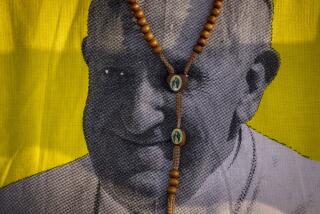‘Civil’ gay marriage has religious consequences
- Share via
Advocates of same-sex civil marriage often emphasize the “civil,” as a way to underline the fact that churches with objections to gay marriage have nothing to fear from what Joni Mitchell called “a piece of paper from the city hall.” In one sense, that’s obviously true: Civil same-sex marriage doesn’t threaten a religion’s 1st Amendment right to determine eligibility for one of its sacraments. (Nor, despite the paranoid ravings of some fundamentalists, will laws against discrimination on the basis of sexual orientation lead to hate-speech charges against homophobic preachers.)
And yet, when it comes to same-sex marriage, the wall of separation between church and state is a porous one. By that I mean that the most eloquent argument for civil same-sex marriage -- public recognition of the ennobling nature of homosexual love -- also resonates in the debate over religious recognition of same-sex relationships.
Without using the term “marriage,” the Episcopal Church has now authorized a rite called “Witnessing and Blessing of a Lifelong Covenant.” Members of same-sex couples would declare that they are “bound to one another in a holy covenant, as long as they both shall live,” and they may exchange rings.
It would be naive to think that this evolution in the theology of same-sex relationhships was unaffected by the social forces that resulted in the approval in some states of same-sex civil marriage. By the same token, the decision of the Episcopal Church a generation ago to ordain women as priests reflected feminist trends in the larger society.
The city of God and the city of man (and woman) are not hermetically sealed off from one another. The civil rights movement of the 1960s was about just that -- civil rights -- but it also influenced attitudes within the church (including the Southern Baptist Convention) about racial equality in the eyes of God.
President George W. Bush was widely criticized when, in explaining his opposition to civil same-sex marriage, he said: “Our nation must defend the sanctity of marriage.” Stupid Bush! Didn’t he realize that sanctity has nothing to do with civil marriage?
Except that it does. Clearly, advocates of same-sex marriage believe it is more than “a piece of paper from the city hall” (something that could also be said of a fishing license). To the extent that society as a whole comes to agree, that will have consequences for the way religious institutions think about the sacrament of marriage. Today it’s the Episcopal Church, but someday a Baptist minister may be blessing a “lifelong covenant” between two men or two women.
ALSO:
Vin Scully, pitch perfect for the Dodgers
Goldberg: Blame Barclays, not capitalism
New tactic for Democratic candidates: stalking
More to Read
A cure for the common opinion
Get thought-provoking perspectives with our weekly newsletter.
You may occasionally receive promotional content from the Los Angeles Times.










